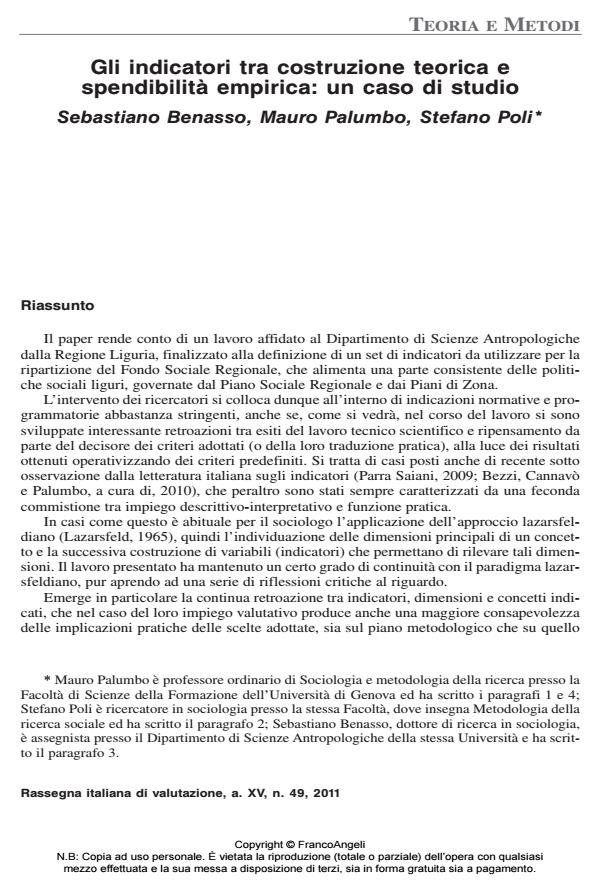Gli indicatori tra costruzione teorica e spendibilità empirica: un caso di studio
Journal title RIV Rassegna Italiana di Valutazione
Author/s Sebastiano Benasso, Mauro Palumbo, Stefano Poli
Publishing Year 2012 Issue 2011/49
Language Italian Pages 16 P. 9-24 File size 501 KB
DOI 10.3280/RIV2011-049002
DOI is like a bar code for intellectual property: to have more infomation
click here
Below, you can see the article first page
If you want to buy this article in PDF format, you can do it, following the instructions to buy download credits

FrancoAngeli is member of Publishers International Linking Association, Inc (PILA), a not-for-profit association which run the CrossRef service enabling links to and from online scholarly content.
The paper describes a research performed by the Department of Anthropological Sciences for the Regione Liguria, finalized to the definition of a set of indicators for the distribution of the Regional Social Fund, feeding a consistent part of Liguria’s social policies, governed by the Regional Social Plan and by Local Plans. The research is inserted in a setting of quite rigid normative and programming indications, even if, as it will be described, have taken places interesting retroactions between scientific results and the re-thinking of adopted criteria (or of their practical translation) by the decision maker, considering the results obtained though the operationalization of pre-defined criteria. These aspects have been recently observed by the Italian theoretical framework (Parra Saiani, 2009; Bezzi, Cannavò e Palumbo, a cura di, 2010), being always characterized by a proficient mix between descriptive-interpretative use and practical function. In these cases it is mainly used the Lazarsfeld sociological approach (Lazarsfeld, 1965), such as the selection of principal dimensions of the concept and the successive realization of variable (indicators) permitting to observe such dimensions. The research has maintained a certain degree of continuity with the Lazarsfeld’s paradigm, even if opening to some critical reflections about it. More specifically, it emerges a continuous retroaction between indicators, dimensions and indicated concepts, that in their evaluative use produces also a wider consciousness of practical implications of adopted choices, both on the methodological plan, both on the political one. In this way, it is obtained a result that produces innovations and empowerment both on classic working models in social research, both on interested decisional processes.
Keywords: Theory of indicators, policy relevant indicators systems, socioeconomic indicators, stakeholders’ participation, social expenditure.
Sebastiano Benasso, Mauro Palumbo, Stefano Poli, Gli indicatori tra costruzione teorica e spendibilità empirica: un caso di studio in "RIV Rassegna Italiana di Valutazione" 49/2011, pp 9-24, DOI: 10.3280/RIV2011-049002